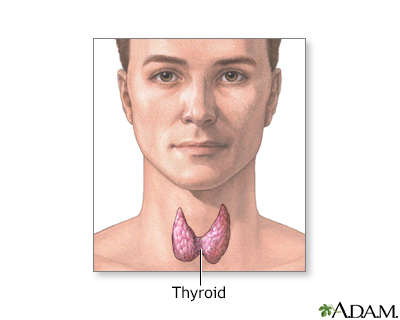Thyroid storm
Definition
Thyroid storm is a rare life-threatening condition of the thyroid gland. It develops in cases of untreated hyperthyroidism, or overactive thyroid (thyrotoxicosis).
The thyroid gland is located in the neck, just above where your collarbones meet in the middle.
Alternative Names
Thyrotoxic storm; Thyrotoxic crisis; Hyperthyroid storm; Accelerated hyperthyroidism; Thyroid crisis; Thyrotoxicosis - thyroid storm
Causes
Thyroid storm occurs in people with uncontrolled hyperthyroidism due to a major stress such as:
- Trauma
- Heart attack
- Infection
Rarely, thyroid storm can be caused by radioactive iodine therapy for Graves disease. This can occur even a week or more after treatment.
Symptoms
Symptoms are severe and may include any of the following:
- Agitation
- Change in alertness (consciousness)
- Confusion
- Diarrhea
- Increased temperature
- Pounding heart (tachycardia)
- Restlessness
- Shaking
- Sweating
- Bulging eyeballs
Exams and Tests
The health care provider may suspect thyrotoxic storm based on:
- A high systolic (top number) blood pressure reading with a lower diastolic (bottom number) blood pressure reading (wide pulse pressure)
- A very high heart rate
- A history of hyperthyroidism
- An exam of your neck may find that your thyroid gland is enlarged (goiter)
Blood tests are done to check thyroid hormones TSH, free T4 and T3.
Other blood tests are done to check heart and kidney functions and to check for infection. Liver function tests provide added diagnosis and treatment information.
Treatment
Thyroid storm is a medical emergency. It is life threatening. Often, the person needs to be admitted to the intensive care unit. Treatment may include:
- Oxygen therapy for breathing problems
- Fluids for dehydration
- Cooling blankets to return the body temperature to normal
- Monitoring any excess fluid in older people with heart or kidney disease
- Medicines to manage agitation
- Medicine to slow the heart rate
- Vitamins and glucose
The goal of treatment is to decrease thyroid hormone levels in the blood. Sometimes, high doses of iodine is given to try and stun the thyroid. Other drugs known as thionamides may be given to lower the hormone level in the blood. Beta blocker medicines are often given by vein (IV) to slow the heart rate, lower blood pressure, and block the effects of the thyroid hormone excess. In some severe cases, glucocorticoids (steroids) are given.
Antibiotics are given in case of infection.
Possible Complications
Irregular heart rhythms (arrhythmias) may occur. Heart failure and fluid in the lungs (pulmonary edema) can develop rapidly and cause death.
When to Contact a Medical Professional
This is an emergency condition. Call 911 or the local emergency number if you have hyperthyroidism and experience symptoms of thyroid storm.
Prevention
To prevent thyroid storm, hyperthyroidism should be treated.
Gallery

References
Jonklaas J, Cooper DS. Thyroid. In: Goldman L, Schafer AI, eds. Goldman-Cecil Medicine. 26th ed. Philadelphia, PA: Elsevier; 2020:chap 213.
Marino M, Vitti P, Chiovato L. Graves' disease. In: Jameson JL, De Groot LJ, de Kretser DM, et al, eds. Endocrinology: Adult and Pediatric. 7th ed. Philadelphia, PA: Elsevier Saunders; 2016:chap 82.
Tallini G, Giordano TJ. Thyroid gland. In: Goldblum JR, Lamps LW, McKenney JK, Myers JL, eds. Rosai and Ackerman's Surgical Pathology. 11th ed. Philadelphia, PA: Elsevier; 2018:chap 8.
Thiessen MEW. Thyroid and adrenal disorders. In: Walls RM, Hockberger RS, Gausche-Hill M, eds. Rosen's Emergency Medicine: Concepts and Clinical Practice. 9th ed. Philadelphia, PA: Elsevier; 2018:chap 120.